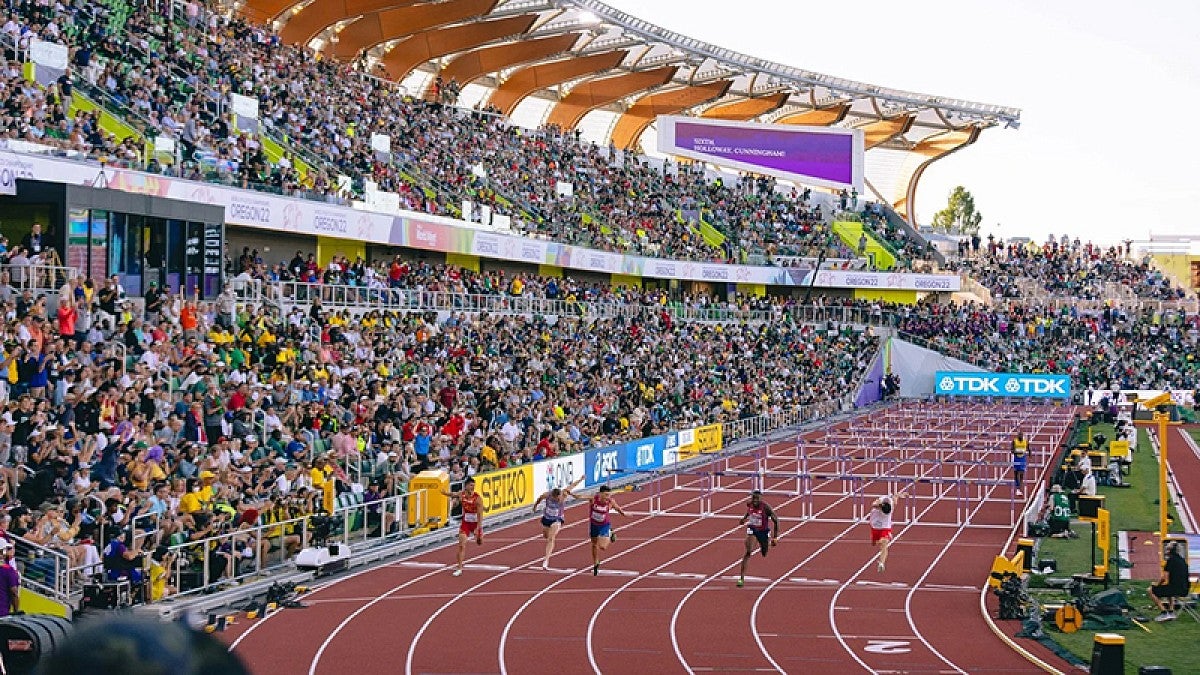The University of Oregon is partnering with nine other universities around the world to establish a collective that aims to become a trusted and respected source of higher-education knowledge, research and policy advice in the world of sport.
The Global Sport University Network will aggregate research, faculty insights and student energy to solve complex problems that no one single university could tackle on its own. It plans to connect industry, governing bodies, sports commissions, media organizations and other stakeholders with academics researching relevant areas.
“The vision is to bring the world together through sport, and to be a world-wide expert and source of knowledge and policy advice in sport,” said Dennis Galvan, dean and vice provost of for the Division of Global Engagement.
The network’s founding partners are the UO and England’s Loughborough University, the world’s leading university for sports-related academia, according to QS World University Rankings, and a hub for sports in the United Kingdom.
Loughborough’s chancellor is Lord Sebastian Coe, a two-time Olympic champion in the 1,500 meters, and the current president of World Athletics (formerly known as the International Association of Athletics Federation), the international governing body for track and field and other running events.
The Global Sports University Network will host its first international summit at the UO in September 2024.
The other universities on the network’s Leadership Council are:
- German Sport University Cologne
- Massachusetts Institute of Technology
- Nanyang Technological University in Singapore
- University of British Columbia
- University of Cape Town in South Africa
- University of Queensland in Australia
- University of São Paulo in Brazil
- Waseda University in Tokyo
University leadership and faculty members at the UO associated with the Sport and Wellness Initiative began talking with their counterparts at Loughborough in the summer of 2022 in the lead up to the World Athletics Championships in Eugene.
As the presidents, provosts and researchers talked over the ensuing months, the idea of creating a network of universities took shape, and they began developing a framework for the new organization and talking with other universities about joining the effort.
In September, representatives from the 10 universities across six continents on the Leadership Council met in Loughborough, joined by members of the media, industry, sports federations and sports bodies, to discuss the mission and vision of the network and how to make the greatest impact. Delegates defined the mission and themes of the network and affirmed they would move forward with the development of the network and the first international summit in 2024.
“This group of world-leading academics feel strongly there is opportunity to work with external partners to tackle some big challenges through the lens of sport,” said Carlyn Schreck, the UO’s assistant vice president for presidential initiatives.
The network will work on four themes to start: health and performance, such as injury prevention, physical health and mental well-being of all athletes; inclusivity for all, at all levels, including gender, race, disability and sexuality; political and societal change, including how sport can aid development, peace-building and social cohesion initiatives; and sustainability, including how to minimize the environmental impact of sport and accelerate progress toward net zero greenhouse gas emissions.
“We have an opportunity to leverage university research to lend credence in some of these discussions,” said Robert Guldberg, executive director of the Knight Campus for Accelerating Scientific Impact and director of the Wu Tsai Human Performance Alliance at Oregon. “In some of these areas, the topics are so big and important, they’re not something one researcher or one university can do on their own. Creating this network of experts is a terrific opportunity.”
What GSUN the sports network will not do is commission research, take on a lobbying role or express viewpoints on any particular issue.
Organizers are still working on details such as what the structure of the network will be, how it will be funded and what the theme of the first summit in 2024 will be. In addition, members are reaching out to partners in sports organizations, non-governmental organizations and sports media.
—By Tim Christie, Office of the Provost
—Top photo: Hayward Field played host to the World Championships Oregon22 last year


